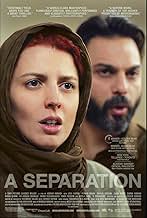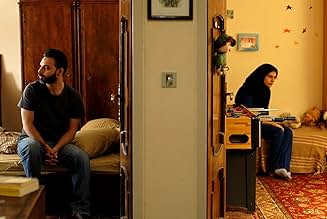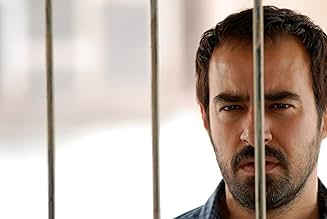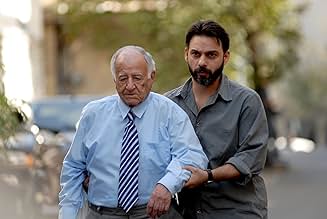Lorsque sa femme le quitte, Nader engage une aide-soignante pour s'occuper de son père malade. Il ignore alors que la jeune femme est enceinte et a accepté ce travail sans l'accord de son ma... Tout lireLorsque sa femme le quitte, Nader engage une aide-soignante pour s'occuper de son père malade. Il ignore alors que la jeune femme est enceinte et a accepté ce travail sans l'accord de son mari, un homme psychologiquement instableLorsque sa femme le quitte, Nader engage une aide-soignante pour s'occuper de son père malade. Il ignore alors que la jeune femme est enceinte et a accepté ce travail sans l'accord de son mari, un homme psychologiquement instable
- Récompensé par 1 Oscar
- 89 victoires et 52 nominations au total
Payman Maadi
- Nader
- (as Peyman Moadi)
Résumé
Reviewers say 'A Separation' delves into family, duty, societal expectations, and complex human relationships, exploring moral dilemmas, class distinctions, and cultural norms. It portrays intense emotions like tension, frustration, love, and betrayal through realistic interactions. The narrative is lauded for its complexity, presenting ambiguous moral questions without clear 'good' or 'bad' characters. The film is frequently praised for evoking deep emotional responses and provoking thought on universal human experiences.
Avis à la une
10jsrees
This is the first Iranian film I've seen, and I'm recommending it to every-one I know. It is so well-crafted; the twists of the plot throw up new moral dilemmas for all the protagonists, which are explored sensitively and without judgement - so refreshingly unlike mainstream American films. I felt sympathy for all the characters, even the threatening Hodjat, full of misplaced rage which often erupts volcanically. And as a footnote, the film felt like an intimate view into a society that our news media portray as monochromatic and extremely foreign. (I am writing this a few days after the UK embassy in Tehran was ransacked)
If mainstream cinema leaves you soulless, see this film.
If you have a modicum of intelligence, see this film.
If you like great acting and directing, see this film.
If you like great writing and editing, see this film.
If you have an interest in law, see this film.
If you are a parent, see this film.
A Separation is not harrowing or depressing. Fear not as I did before. If you don't like subtitles, you will forget they are there. Do not read any more detailed reviews. Go without preconception. A Separation deserves all the plaudits it is getting and deserves a much wider audience. Minimalistic and economic, a Separation is one of the finest, most chiselled pieces of cinema of this millennium.
If you have a modicum of intelligence, see this film.
If you like great acting and directing, see this film.
If you like great writing and editing, see this film.
If you have an interest in law, see this film.
If you are a parent, see this film.
A Separation is not harrowing or depressing. Fear not as I did before. If you don't like subtitles, you will forget they are there. Do not read any more detailed reviews. Go without preconception. A Separation deserves all the plaudits it is getting and deserves a much wider audience. Minimalistic and economic, a Separation is one of the finest, most chiselled pieces of cinema of this millennium.
It seems that a court room drama could be the best place for Frahadi to recreate his very own world and confront us with a short and somehow faraway situations and incidents in life. We think these kinds of happenings and conflicts would not take place in our lives but with his realistic world and characters they seem so close and possible to anyone. Asghar Farhadi loves to put his audience in place of judge, as his other pictures like About Eli or Fireworks Wednesday and here with no fear he takes us straight to a court room. But the thing is that the judge does not provide any help for us to make a clear judgment and surprisingly makes the situation even more complicated. Yes Farhadi doesn't want us to make a judgment, He makes us watch and observe and leave the theater with a big fork in front of us.It Seems that any single decision creates another world full of forks and not taken ways.
when nobody is clearly guilty and the line between black and white is so dim. And again here we are in Frhadi's powerful hands surprised to the end of the movie. You can't leave your chair even for one second because the story never lets you to lose even a single moment. And like a tennis ball we're always being shot from this side to the other. And finally we are the daughter shocked and disable to make a decision. May be we haven't seen or we don't want to see this side of life, where nothing is clear, when small lies and unimportant undone things and unsaid words gang up against us and turn to a big disaster. Frahadi has found his own world and his own language and his own version of life. Something we'd never seen before. We appreciate that. He can easily bombard us with information and surprise us with tiny details that seem nothing but like a snowball rolling down a slope they can form a big drama.
when nobody is clearly guilty and the line between black and white is so dim. And again here we are in Frhadi's powerful hands surprised to the end of the movie. You can't leave your chair even for one second because the story never lets you to lose even a single moment. And like a tennis ball we're always being shot from this side to the other. And finally we are the daughter shocked and disable to make a decision. May be we haven't seen or we don't want to see this side of life, where nothing is clear, when small lies and unimportant undone things and unsaid words gang up against us and turn to a big disaster. Frahadi has found his own world and his own language and his own version of life. Something we'd never seen before. We appreciate that. He can easily bombard us with information and surprise us with tiny details that seem nothing but like a snowball rolling down a slope they can form a big drama.
I'm an Iranian, but I've never been interested in Iranian cinema. I only watch Iranian films when they win awards or receive international recognition. I'm a fan of Kiarostami and Majidi, but I can't really say that I like all of their films. I watched Farhady's previous film (About Elly) about a year ago, and the first thing which struck me was how culturally detached the movie was in its depiction of an event. At the time, I believed this to have been the cause of this director's success. Watching Nader and Simin, however, proved that I was terribly mistaken.
Asghar Farhady's obsession with the concept of judgment is once again the driving force behind his latest feature. The life-like depiction of the Iranian courtroom (which is in no way impartial) places the audience in the Judge's seat from the very beginning. The extremely believable acting and insanely complex script compel the viewer to make up his/her mind just like when reading a court case. As for the screenplay, I'm almost certain the events in this film actually happened in real life, because in no way could one fabricate such a chaotically complex series of events, so beautifully woven into a coherent whole.
Despite being very Iranian in its narrative style and its depiction of Iranian culture (the sanctity of Family, faith, commitment towards parents and married life), I believe that this film could easily appeal to the Western audiences just like a film by Inaritu or Haneke (although I'm pretty sure it won't be nominated for an Oscar for political reasons).
After seeing About Elly, I thought Farhady's success was just a one-time fling, but coming out of the theater, having watched Nader and Simin, I was proud to have another Iranian director added to my international list of favorites.
Asghar Farhady's obsession with the concept of judgment is once again the driving force behind his latest feature. The life-like depiction of the Iranian courtroom (which is in no way impartial) places the audience in the Judge's seat from the very beginning. The extremely believable acting and insanely complex script compel the viewer to make up his/her mind just like when reading a court case. As for the screenplay, I'm almost certain the events in this film actually happened in real life, because in no way could one fabricate such a chaotically complex series of events, so beautifully woven into a coherent whole.
Despite being very Iranian in its narrative style and its depiction of Iranian culture (the sanctity of Family, faith, commitment towards parents and married life), I believe that this film could easily appeal to the Western audiences just like a film by Inaritu or Haneke (although I'm pretty sure it won't be nominated for an Oscar for political reasons).
After seeing About Elly, I thought Farhady's success was just a one-time fling, but coming out of the theater, having watched Nader and Simin, I was proud to have another Iranian director added to my international list of favorites.
Today I had the pleasure of watching A Separation, a foreign film that has been critically-acclaimed for some time now. What we have here is definitely one of the year's best films. Intriguing, captivating, and ambiguous.
I had no idea that this was going to turn out to be some sort of court drama. I just want to first talk about the direction. Farhadi masterfully constructs these characters, and we enter into a state in their lives where we serve as some sort of observant. Even before the actual plot of the film comes along, his tight screenplay and direction leave us trying to astutely observe what is happening around every corner of the frame. We barely know these characters, and yet, tension is arising from the simplest of every-day matters. Why? Why indeed, as it becomes apparent, the film gets more serious in its plot. It is here that the real reason as to why we are observing moments of these characters' lives comes into focus. Questions arise, as to who did what, and who saw what, and who heard this or that. The film takes a neutral ground in all of this, and yet we ourselves can't help but try to memorize even the smallest of details that could perhaps help us out in figuring out the actual truth. The film never judges its characters, which is why we also have to be sort of neutral in all of this, even when we don't want to, even when we think we know what really happened. This is a mystery in the most unusual and most natural way. We are hooked into the film's plot line, and as much as the film won't let us go, we don't want to let go. We want to hang on and catch up with it, and not miss one single beat of what is happening. Such precise and balanced filmmaking.
I do want to take note of the fantastic performances. The entire cast is wonderful, especially the three main leads. Not one single moment is wasted in their portrayals. Overall, this is a near-perfect film, one of the most intriguing and engaging films of the year, and the ending serves entirely to what had come before, and is fully satisfying.
I had no idea that this was going to turn out to be some sort of court drama. I just want to first talk about the direction. Farhadi masterfully constructs these characters, and we enter into a state in their lives where we serve as some sort of observant. Even before the actual plot of the film comes along, his tight screenplay and direction leave us trying to astutely observe what is happening around every corner of the frame. We barely know these characters, and yet, tension is arising from the simplest of every-day matters. Why? Why indeed, as it becomes apparent, the film gets more serious in its plot. It is here that the real reason as to why we are observing moments of these characters' lives comes into focus. Questions arise, as to who did what, and who saw what, and who heard this or that. The film takes a neutral ground in all of this, and yet we ourselves can't help but try to memorize even the smallest of details that could perhaps help us out in figuring out the actual truth. The film never judges its characters, which is why we also have to be sort of neutral in all of this, even when we don't want to, even when we think we know what really happened. This is a mystery in the most unusual and most natural way. We are hooked into the film's plot line, and as much as the film won't let us go, we don't want to let go. We want to hang on and catch up with it, and not miss one single beat of what is happening. Such precise and balanced filmmaking.
I do want to take note of the fantastic performances. The entire cast is wonderful, especially the three main leads. Not one single moment is wasted in their portrayals. Overall, this is a near-perfect film, one of the most intriguing and engaging films of the year, and the ending serves entirely to what had come before, and is fully satisfying.
Le saviez-vous
- AnecdotesThe film has no musical score, except during the end credits.
- GaffesAlthough Razieh had gone to the doctor to see if her baby was still alive a few hours before she was beaten by Nader, the judge never asked her about the result of the medical check. Also, after medical examination, it should be clear for Razieh to know about the situation of her baby unless she couldn't reach the doctor at the time.
- ConnexionsFeatured in Ebert Presents: At the Movies: Épisode #2.12 (2011)
Meilleurs choix
Connectez-vous pour évaluer et suivre la liste de favoris afin de recevoir des recommandations personnalisées
Détails
Box-office
- Budget
- 500 000 $US (estimé)
- Montant brut aux États-Unis et au Canada
- 7 099 055 $US
- Week-end de sortie aux États-Unis et au Canada
- 59 481 $US
- 1 janv. 2012
- Montant brut mondial
- 22 926 076 $US
- Durée2 heures 3 minutes
- Couleur
- Mixage
- Rapport de forme
- 1.85 : 1
Contribuer à cette page
Suggérer une modification ou ajouter du contenu manquant
































